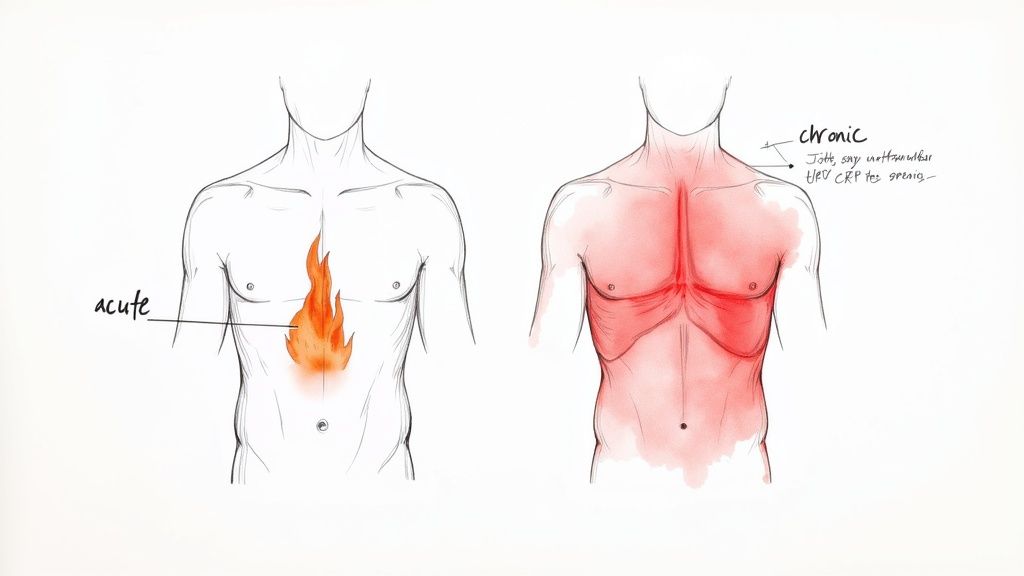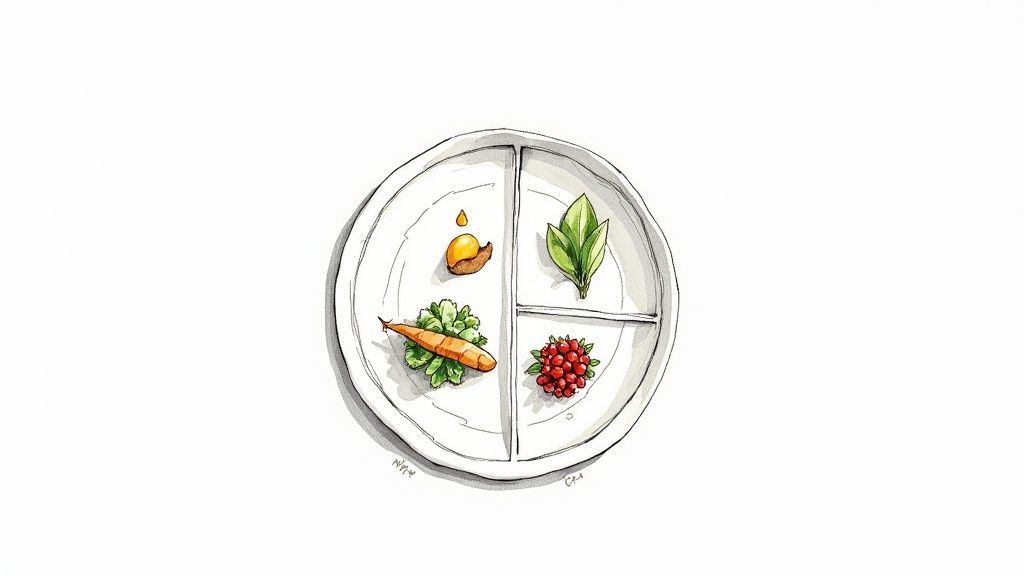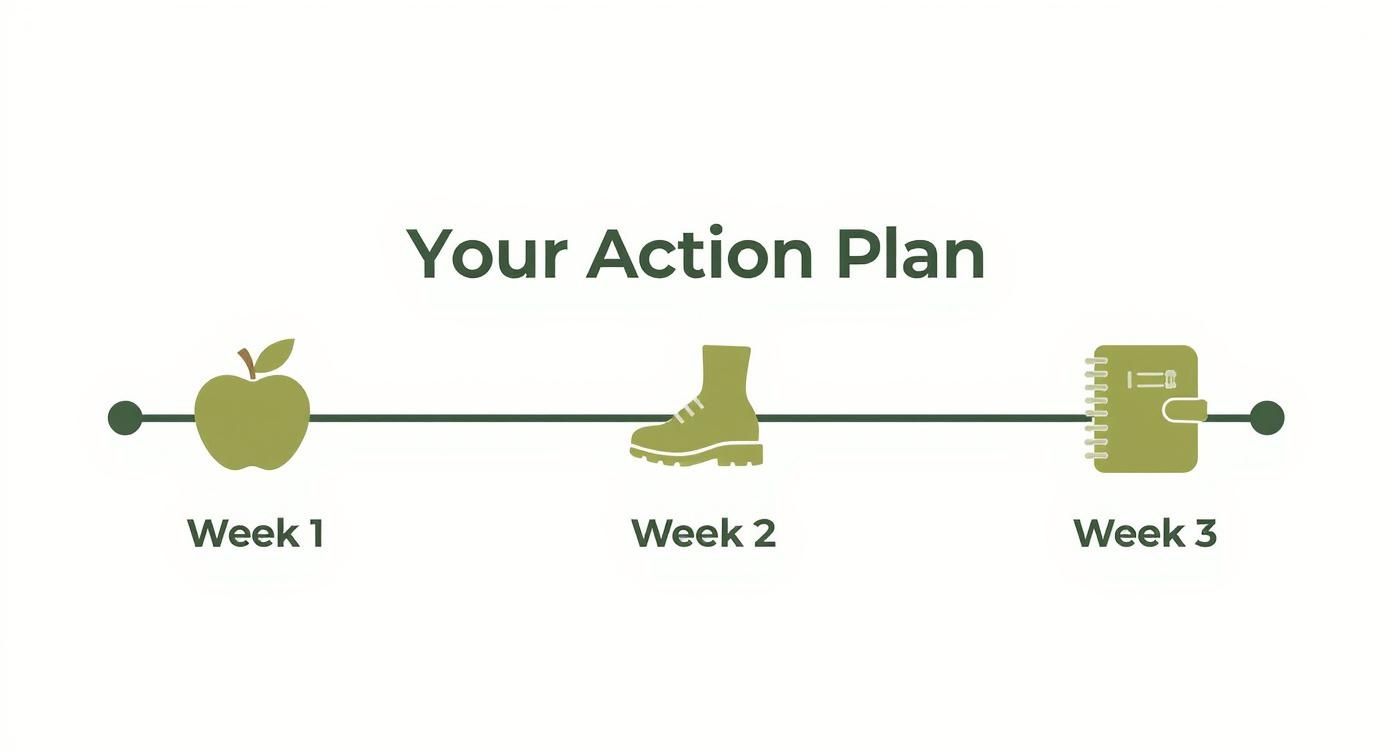To reduce inflammation naturally, you need a plan built on simple, consistent actions. It all comes down to choosing whole foods, moving your body gently, getting quality sleep, and managing stress. This guide provides actionable steps to calm your body's inflammatory response and promote genuine, long-term well-being from the inside out.
Understanding What Inflammation Really Means

Before you can tackle inflammation, you need to understand what it is. Inflammation is a vital, natural process—your body's first line of defence against injury and infection. It's a biological first-responder rushing to protect and heal you.
The real problem starts when this protective switch gets stuck in the 'on' position. This is where we need to draw a clear line between the two very different types of inflammation.
The Good Guy: Acute Inflammation
Remember the last time you cut your finger or sprained an ankle? The area quickly became red, swollen, and warm. That’s acute inflammation in action. It’s a short-term, localised response designed to deal with a threat—whether it's bacteria or damaged cells—and kickstart the healing process.
This kind of inflammation is your friend. It's temporary, targeted, and disappears once the job is done. Without it, even minor injuries could become life-threatening.
The Hidden Danger: Chronic Inflammation
Chronic inflammation is a completely different beast. It's a low-grade, persistent state of alert that can simmer away for months, or even years. Imagine your body's internal alarm system constantly blaring, sending out inflammatory cells and signals with no real emergency to handle.
This continuous, low-level stress slowly wears down your body. Unlike the obvious signs of a sprain, chronic inflammation is often invisible, working quietly in the background and contributing to a huge range of health issues over time.
"Chronic inflammation is a silent process that can simmer for years, gradually damaging tissues and setting the stage for more serious health conditions. Recognising its triggers is the first step toward reclaiming your health."
This slow-burning fire is often fuelled by factors in our modern lives. To reduce inflammation naturally, your first action is to get a handle on these triggers.
Common Triggers Fuelling the Fire
Your daily habits and environment play a massive role in either calming or promoting chronic inflammation. The culprits are often parts of a modern lifestyle we don’t even think twice about.
- Dietary Choices: A diet heavy in processed foods, refined sugars, unhealthy trans fats, and too much alcohol can easily provoke an inflammatory response. These foods can disrupt your gut health and send stress signals all over your body.
- Persistent Stress: When you're constantly stressed, your body pumps out the hormone cortisol. While it's initially anti-inflammatory, prolonged high levels can lead to cortisol resistance, which basically lets inflammation run wild.
- Lack of Quality Sleep: Sleep is your body's dedicated repair time. Consistently poor sleep messes with this crucial process, preventing the regulation of inflammatory hormones and encouraging a pro-inflammatory state.
- A Sedentary Lifestyle: Not moving enough can contribute to inflammation. Regular, moderate physical activity helps circulate blood and releases anti-inflammatory compounds from your muscles.
- Environmental Factors: Exposure to pollutants, toxins, and everyday chemicals can also place a huge burden on your immune system, triggering an inflammatory cascade.
Understanding these deep-rooted lifestyle and dietary factors is key. You can dive deeper into what causes chronic inflammation in our detailed guide. Once you know what’s fuelling the fire, you have the power to start putting it out.
Building Your Anti-Inflammatory Plate

Food is your most direct and powerful tool for managing inflammation. What you put on your plate every single day can either fuel that internal fire or help put it out. This isn't about a restrictive, short-term diet, but a sustainable way of eating that actively calms your body from the inside.
Forget perfection. Your goal is to make conscious, consistent choices. When you focus on whole, nutrient-dense foods, you give your body the antioxidants, healthy fats, and micronutrients it needs to get its inflammatory response back under control, naturally.
Prioritise Foods That Fight Inflammation
The core action of an anti-inflammatory eating plan is simple: eat more real food. Think vibrant, colourful, and as close to its natural state as possible. These foods are packed with the compounds that directly fight oxidative stress and soothe inflammatory pathways.
Incorporate foods like blueberries, olive oil, spinach, green tea, turmeric, and oily fish to make a real difference. Consistently making antioxidant-rich foods a part of every meal is your body’s best defence against cellular damage.
Here are the key foods to build your meals around:
- Oily Fish: Choose salmon, mackerel, and sardines. They are rich in omega-3 fatty acids (EPA and DHA), which are potent anti-inflammatory agents. They help balance out the pro-inflammatory omega-6 fats so common in modern diets.
- Colourful Fruits and Berries: Eat blueberries, cherries, and raspberries. Their deep colours signal they are full of antioxidants called anthocyanins, which are proven to reduce inflammation.
- Leafy Green Vegetables: Add spinach, kale, and chard to your meals. They are loaded with antioxidants and vitamins like Vitamin K, which plays a key role in regulating your body's inflammatory response.
- Nuts and Seeds: Snack on almonds, walnuts, and flaxseeds. They are a brilliant source of healthy fats, fibre, and more antioxidants. Walnuts are especially high in crucial anti-inflammatory omega-3s.
- Healthy Fats: Make extra virgin olive oil and avocados your staples. Olive oil contains oleocanthal, a compound with effects similar to ibuprofen, while avocados are rich in heart-healthy monounsaturated fats.
Minimise Foods That Promote Inflammation
Just as important as what you add is what you limit. Some foods actively trigger or worsen chronic inflammation, undoing all your hard work. The main culprits are usually highly processed and full of junk.
You don’t have to banish these forever, but cutting back will make a huge impact.
- Sugar and High-Fructose Corn Syrup: Avoid sugary drinks, sweets, and pastries. They cause a massive spike in blood sugar, which can trigger a flood of inflammatory messengers.
- Refined Carbohydrates: Limit white bread, pasta, and most packaged snacks, as they have been stripped of their fibre and nutrients. They act a lot like sugar in the body.
- Trans Fats: Check labels for trans fats, often lurking in fried foods, margarine, and many processed snacks. These artificial fats are notoriously inflammatory.
- Excessive Omega-6 Fats: Reduce your intake of vegetable oils like soy, corn, and sunflower oil. While we need some omega-6 fats, our diets are overflowing with them, creating an imbalance with omega-3s that drives inflammation.
A Practical Comparison
Seeing the difference laid out makes choices at the supermarket much easier. Use this quick-reference guide to help you choose what to pile on your plate and what to walk past.
Foods to Prioritise vs Foods to Minimise
| Anti-Inflammatory Foods (Prioritise) | Pro-Inflammatory Foods (Minimise) | Why It Helps |
|---|---|---|
| Oily Fish (Salmon, Mackerel) | Processed Meats (Sausages, Bacon) | Provides Omega-3s that actively reduce inflammation, countering the effects of nitrates. |
| Berries & Dark Cherries | Sugary Sweets & Drinks | Delivers powerful antioxidants without the inflammatory blood sugar spike caused by sugar. |
| Leafy Greens (Spinach, Kale) | Refined Grains (White Bread, Pasta) | Packed with vitamins and fibre that support gut health, unlike refined carbs which can disrupt it. |
| Nuts & Olive Oil | Margarine & Vegetable Oils (Corn, Soy) | Offers healthy monounsaturated and omega-3 fats that calm inflammation, unlike excessive omega-6s. |
| Spices (Turmeric, Ginger) | Fried Foods & Fast Food | Contains potent anti-inflammatory compounds that fight the oxidative stress caused by unhealthy fats. |
This table isn't about being perfect; it’s a simple guide to help shift the balance in favour of foods that heal.
Simple Meal Swaps for a Less Inflammatory Day
Put this into action with small, easy changes. Instead of a complete diet overhaul, try these simple swaps.
- Breakfast: Ditch sugary cereal for a bowl of porridge topped with blueberries and a sprinkle of walnuts.
- Lunch: Instead of a sandwich on white bread with processed meat, prepare a big salad with grilled salmon, lots of greens, and an olive oil vinaigrette.
- Dinner: Swap a cheesy pasta dish for a stir-fry packed with broccoli, mushrooms, and lean protein, seasoned with fresh ginger and turmeric.
- Snack: Switch out crisps or biscuits for a handful of almonds or an apple with a spoonful of nut butter.
These small, consistent tweaks really add up. They help you build sustainable habits that nourish your body and set you up for long-term well-being.
Mastering Your Lifestyle to Lower Inflammation

While your diet is the foundation, your daily habits are the pillars supporting an anti-inflammatory life. Lasting relief from chronic inflammation comes from the synergy of mindful movement, restorative sleep, and smart stress management.
These three elements work in harmony to regulate hormones, support cellular repair, and keep your immune system calm. Mastering your lifestyle is how you truly take control and reduce inflammation naturally, creating a body that’s both resilient and balanced.
Embrace Gentle and Consistent Movement
When you're dealing with inflammation, pushing your body too hard can add more stress. The goal isn't to shatter personal bests, but to move in a way that soothes, strengthens, and supports.
Regular, moderate activity is a powerful tool. When you move, your muscles release anti-inflammatory substances called myokines, which actively counteract systemic inflammation. Take these actionable steps:
- Walk Briskly: Aim for 30 minutes on most days to get your heart rate up and boost circulation without hammering your joints.
- Try Yoga or Tai Chi: These practices combine gentle stretching with mindful breathing, which directly helps to lower stress hormones and improve flexibility.
- Go Swimming: Use the water to support your joints, allowing you to move freely and build strength without jarring impact.
It’s also worth exploring natural ways to improve circulation for better health, as this ensures vital oxygen and nutrients can get where they need to go. Remember, consistency is everything. A little movement every day is far more powerful than one gruelling session a week.
Prioritise Restorative Sleep
Sleep is non-negotiable in the fight against inflammation. During these hours, your body performs its most important repair work, clearing out cellular waste, regulating immune function, and balancing the hormones that control your inflammatory response.
Consistently getting less than 7-9 hours a night triggers a spike in inflammatory markers like C-reactive protein (CRP), essentially fanning the flames of that low-grade fire.
"Sleep is the body's ultimate reset button. Neglecting it is like trying to put out a fire while someone else keeps adding fuel. Quality sleep is where healing and regulation happen at the deepest cellular level."
To upgrade your sleep, build a solid routine with these actions.
Actionable Sleep Hygiene Tips
- Stick to a Schedule: Go to bed and wake up around the same time every day, even on weekends. This sets your body's internal clock, or circadian rhythm.
- Create a Tech-Free Zone: Power down all devices at least an hour before bed. The blue light from phones and TVs messes with your production of melatonin, the sleep hormone.
- Optimise Your Environment: Make your bedroom a cool, dark, and quiet sanctuary. Use blackout curtains or an eye mask.
- Mind Your Evening Habits: Avoid large meals, caffeine, and alcohol too close to bedtime, as they can disrupt your ability to fall and stay asleep.
Actively Manage Your Stress
The link between stress and inflammation is direct. When you feel stressed, your body pumps out cortisol. In short bursts, this is fine. But when stress becomes chronic, your body can start to ignore cortisol's signals.
This leaves inflammation unchecked. Learning to manage your stress is a core strategy for reducing inflammation naturally.
Effective Stress-Reduction Techniques
- Practice Mindful Breathing: When you feel overwhelmed, stop and take five slow, deep breaths. Inhale through your nose for a count of four, hold for four, and then exhale slowly through your mouth for six. This simple act can instantly calm your nervous system.
- Try Mindfulness or Meditation: Dedicate 5-10 minutes a day to focusing on your breath or using a guided meditation app. This retrains your brain's response to stress.
- Spend Time in Nature: Get outdoors, even for a quick walk in a local park. It's proven to lower cortisol levels and dial down feelings of stress and anxiety.
Understanding how your body's stress response works is the first step towards managing it. For a deeper dive, our guide on the natural ways to reduce cortisol offers even more practical steps. By weaving these small but powerful habits into your day, you create a lifestyle that actively calms your system and builds lasting health.
Tapping into Supplements and Herbal Allies
While diet and lifestyle changes are your primary tools, a few carefully chosen supplements can provide targeted support. Think of them as reinforcements – they don't replace your core strategy, but they can amplify your results, especially when you need an extra edge.
A handful of options stand out because the science backs them up. These compounds work on specific inflammatory pathways, calming your system from angles that food or exercise might not reach on their own.
Potent Anti-Inflammatory Compounds
When choosing supplements, focus on quality and evidence. Certain natural compounds have been studied and have shown a real ability to manage the body's inflammatory response.
Here are a few of the most effective ones to consider:
- Omega-3 Fatty Acids: If you don’t eat oily fish, a good fish oil supplement is the next best thing. Its key components, EPA and DHA, are serious anti-inflammatory agents that disrupt the production of inflammatory chemicals.
- Curcumin (from Turmeric): Curcumin is the potent antioxidant that gives turmeric its bright yellow color. It can block a host of inflammatory molecules. Action tip: always look for a supplement that includes black pepper (piperine) to massively boost how much curcumin your body can absorb.
- Ginger: Ginger contains compounds called gingerols, which have impressive anti-inflammatory effects. They work similarly to some over-the-counter pain relievers by blocking the creation of substances that promote inflammation.
These supplements give you a concentrated dose, making it easier to get the levels your body needs to push back against chronic inflammation.
The Power of Botanical Support
Traditional herbs have been used for centuries to soothe inflammation, and modern science is finally showing us why they work. These botanicals often provide a wider range of support, tackling the problem from several directions at once.
A real standout here is Nettle Leaf (Urtica dioica). It has a long history in traditional European medicine for calming sore joints, and this isn't just folklore. Solid clinical evidence highlights its anti-inflammatory credentials.
Studies show nettle leaf can help dial down key inflammatory messengers like IL-1β and COX-2. One interesting study with UK patients suffering from acute arthritis found that those who added a nettle leaf infusion to their standard medication saw a much bigger drop in their CRP levels (a key inflammation marker) than those just on the medication. You can read more on the published cellular studies on nettle leaf if you want to dive deeper.
Another incredible group of botanicals are adaptogens. These are clever herbs that help your body adapt to physical, chemical, or biological stress. Since chronic stress is a major trigger for inflammation, adaptogens can indirectly help by regulating your body’s stress response. If that sounds like something you need, our guide on using ashwagandha for stress has some great insights.
Choosing a supplement isn't about grabbing the most popular bottle off the shelf. It’s about figuring out what your body actually needs and finding a high-quality product that can deliver real, targeted support on your journey.
Making Smart and Safe Choices
Before you add anything new to your routine, it’s vital to be smart about it. The supplement industry isn't regulated as strictly as medicines, which means the quality can be inconsistent.
Here’s how to make a good choice:
- Chat with a Pro: Always talk with your doctor or a qualified healthcare provider before starting a new supplement. They can help you figure out the right dose and make sure it won’t interfere with any medications or existing health conditions.
- Look for Third-Party Testing: Good brands will get their products checked by an independent lab (like NSF or USP) to verify that what's on the label is what's in the bottle. This ensures purity and potency.
- Check for Bioavailability: Some compounds are hard for our bodies to absorb. Look for formulas designed for easy use, like curcumin paired with piperine or omega-3s in their natural triglyceride form.
- Start Low and Go Slow: Begin with the smallest effective dose and see how your body responds. You can always increase it later if needed. Remember, these are powerful substances – more isn't always better.
By being a savvy customer and working with a professional, you can safely integrate supplements into your plan and make them a valuable part of your mission to reduce inflammation naturally.
Putting It All Into Practice
Diving into an anti-inflammatory lifestyle isn't about a massive, overnight overhaul. The secret to making these changes stick is to build momentum slowly, weaving new habits into your life until they feel second nature. This is your roadmap to turn knowledge into real-world action that lasts.
Instead of trying to do everything at once, focus on adding one new thing each week. Small, consistent wins build the foundation for long-term health and make the process feel manageable.
Weaving New Habits Into Your Life
A phased approach is always more effective. Think of it as building a wall, one brick at a time.
Here’s a simple framework to get you started:
- Week 1: Focus on Hydration and One Easy Swap. Your first task is simple. Aim to drink two extra glasses of water each day. Then, swap one inflammatory item (like a fizzy drink or a sugary snack) for an anti-inflammatory one (like a herbal tea or a handful of berries).
- Week 2: Bring in Some Gentle Movement. Add a 20-minute brisk walk to your daily routine. The goal isn’t intensity; it’s about getting your body moving consistently.
- Week 3: Prioritise Your Sleep. This week, turn off all screens one hour before your intended bedtime. Use that time to read a book, do light stretching, or listen to calming music.
- Week 4: Add a Few Mindful Minutes. Find just five minutes each day for mindful breathing. You can do it at your desk, before a meal, or right after you wake up.
This slow-and-steady method gives each new habit a chance to become automatic before you introduce the next one.
Tracking Progress Beyond the Numbers
While getting lab markers like CRP checked is useful, those numbers don't paint the full picture. The most powerful signs of progress are the ones you feel day-to-day. Paying attention to these improvements is what keeps you motivated.
Your "non-scale victories" are where the real magic is. Notice the small shifts—waking up feeling genuinely refreshed, having enough energy for an evening walk, or realising your joints don't feel so stiff in the morning. These are the true rewards.
Try keeping a simple journal to track changes in:
- Energy Levels: Is that 3 PM slump starting to disappear?
- Aches and Pains: Are your joints feeling smoother when you move?
- Sleep Quality: Are you falling asleep faster or waking up less?
- Mental Clarity: Is that persistent "brain fog" finally starting to lift?
When to Check in With Your Doctor
A self-guided plan is incredibly empowering, but it’s crucial to know when to bring in a professional. You are the expert on your own body, so always trust your instincts.
Book an appointment with your GP if you’re experiencing:
- Sudden or severe pain that isn’t getting better.
- Symptoms that are getting worse, even with your lifestyle changes.
- Unexplained weight loss or a feeling of deep, persistent fatigue.
- Signs of an infection, like a fever that won't break.
These could be signals of an underlying issue that needs a medical diagnosis. Taking a smart, responsible approach ensures your journey is both safe and effective. The goal is to work with your body, not against it.
Your Questions Answered: A Practical Guide to Reducing Inflammation
Starting a journey to reduce inflammation naturally often brings up a few common questions. Having clear, straightforward answers makes all the difference, helping you feel confident and in control.
One of the first things people ask is, "How long will it take to feel a difference?" While every body is different, many people report noticing small but significant improvements within just a few weeks. You might find your digestion feels calmer, your joints ache less, or your energy levels are more stable throughout the day.
This simple timeline shows how small, consistent actions can lead to noticeable changes quickly.

The real takeaway here is that progress is gradual. Building foundational habits in diet, movement, and stress management week by week creates lasting momentum.
Will I Have to Give Up My Favourite Foods Forever?
This is another huge concern—the fear of deprivation. But here's the great news: an anti-inflammatory lifestyle isn't about banning foods you love forever. It’s about shifting the balance.
The goal is progress, not perfection. A good way to think about it is the 80/20 approach. Focus on making nutrient-dense, anti-inflammatory choices 80% of the time. This leaves you plenty of flexibility to enjoy a slice of birthday cake or a meal out with friends without a side of guilt. This sustainable mindset is what makes it stick for the long haul.
Adopting an anti-inflammatory lifestyle is a marathon, not a sprint. Consistency over perfection is what drives real, lasting results and helps you build a healthier relationship with food.
Ultimately, it's about making conscious choices that support your well-being most of the time, while still allowing for the occasional treat that brings you joy.
When Should I See a Doctor?
While you can manage a great deal with lifestyle changes, it’s vital to recognise when you need professional medical advice. Self-managing is empowering, but it should never replace a proper diagnosis from a healthcare professional.
Book an appointment with your GP if you experience any of the following:
- Persistent or severe pain that doesn’t improve with your new habits.
- Unexplained symptoms like sudden weight loss, constant fatigue, or a lingering fever.
- Worsening symptoms despite your best efforts to manage them.
These can be red flags for a more serious underlying condition that requires medical attention. Working with a doctor ensures you’re taking a safe, responsible, and effective approach to your health.
At MyOji, we believe in restoring your body's natural balance with powerful, pure ingredients. Our Shilajit gummies are formulated with over 85 trace minerals and potent adaptogens to help manage stress, boost energy, and support your anti-inflammatory journey from within. Discover a simpler way to replenish the essential nutrients your body is missing at https://myoji.co.uk.








